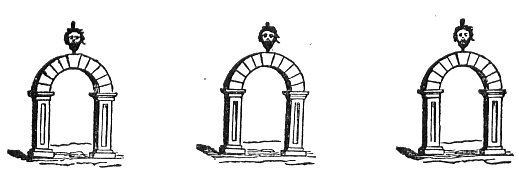p. 176
[Elu of the Twelve.]
THE duties of a Prince Ameth are, to be earnest, true, reliable, and sincere; to protect the people against illegal impositions and exactions; to contend for their political rights, and to see, as far as he may or can, that those bear the burdens who reap the benefits of the Government.
You are to be true unto all men.
You are to be frank and sincere in all things.
You are to be earnest in doing whatever it is your duty to do.
And no man must repent that he has relied upon your resolve, your profession, or your word.
The great distinguishing characteristic of a Mason is sympathy with his kind. He recognizes in the human race one great family, all connected with himself by those invisible links, and that mighty net-work of circumstance, forged and woven by God.
Feeling that sympathy, it is his first Masonic duty to serve his fellow-man. At his first entrance into the Order, he ceases to be isolated, and becomes one of a great brotherhood, assuming new duties toward every Mason that lives, as every Mason at the same moment assumes them toward him.
Nor are those duties on his part confined to Masons alone. He assumes many in regard to his country, and especially toward the great, suffering masses of the common people; for they too are his brethren, and God hears them, inarticulate as the moanings of their misery are. By all proper means, of persuasion and influence,
p. 177
and otherwise, if the occasion and emergency require, he is bound to defend them against oppression, and tyrannical and illegal exactions.
He labors equally to defend and to improve the people. He does not flatter them to mislead them, nor fawn upon them to rule them, nor conceal his opinions to humor them, nor tell them that they can never err, and that their voice is the voice of God. He knows that the safety of every free government, and its continuance and perpetuity depend upon the virtue and intelligence of the common people; and that, unless their liberty is of such a kind as arms can neither procure nor take away; unless it is the fruit of manly courage, of justice, temperance, and generous virtue–unless, being such, it has taken deep root in the minds and hearts of the people at large, there will not long be wanting those who will snatch from them by treachery what they have acquired by arms or institutions.
He knows that if, after being released from the toils of war, the people neglect the arts of peace; if their peace and liberty be a state of warfare; if war be their only virtue, and the summit of their praise, they will soon find peace the most adverse to their interests. It will be only a more distressing war; and that which they imagined liberty will be the worst of slavery. For, unless by the means of knowledge and morality, not frothy and loquacious, but genuine, unadulterated, and sincere, they clear the horizon of the mind from those mists of error and passion which arise from ignorance and vice, they will always have those who will bend their necks to the yoke as if they were brutes; who, notwithstanding all their triumphs, will put them up to the highest bidder, as if they were mere booty made in war; and find an exuberant source of wealth and power, in the people’s ignorance, prejudice, and passions.
The people that does not subjugate the propensity of the wealthy to avarice, ambition, and sensuality, expel luxury from them and their families, keep down pauperism, diffuse knowledge among the poor, and labor to raise the abject from the mire of vice and low indulgence, and to keep the industrious from starving in sight of luxurious festivals, will find that it has cherished, in that avarice, ambition, sensuality, selfishness, and luxury of the one class, and that degradation, misery, drunkenness, ignorance, and brutalization of the other, more stubborn and intractable despots at home

Moe is the founder of GnosticWarrior.com. He is a father, husband, author, martial arts black belt, and an expert in Gnosticism, the occult, and esotericism.







